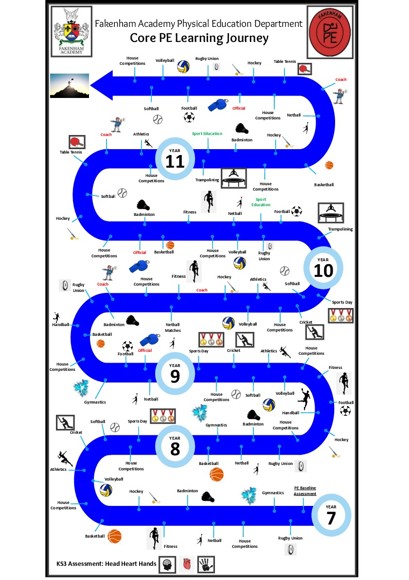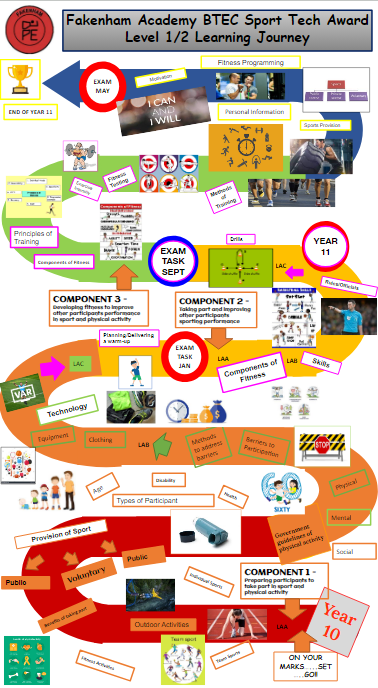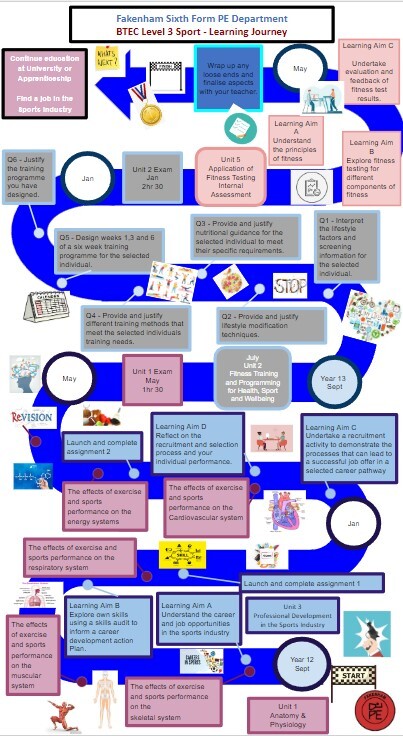- Home
- Curriculum
- Subjects
- Physical Education
Physical Education



Fakenham Academy PE/Sport Department. Curriculum Summary
Last updated: March 2024
Vision:
Physical Education at Fakenham Academy aims to encourage all students to actively engage in lifelong physical activity, not merely as a participant but in other roles, such as an official, a coach and a leader. We aim to offer a wide and varied curriculum that encourages participation in and out of the lesson and inspires our students to lead healthy and active lives.
Examination Sport at KS4 aims to provide knowledge of different types of participants, their needs and how they can take part in sport and exercise within their locality. This allows students to investigate different sporting provisions. Practical performance and leadership in a sport of their choice will aim to create lifelong participation upon leaving school.
Examination Sport at KS5 aims to equip students with the knowledge and understanding needed to go onto higher education or into a career in the sporting industry.
Yearly Intent Statements
What are the aims of specific stages of the curriculum?
Core PE
Year 7: By the end of year 7 students will have developed a love of PE by taking part in a wide range of activities. Students should be equipped with basic skills, tactics and knowledge and understanding of invasion games, striking/fielding games, net/wall games, gymnastics and athletics. Set warm-ups are created specifically for getting the lesson started as soon as possible and these set routines allow the students to take ownership of their learning at the start of the lesson. Students in Yr 7 are offered the opportunity to attend a PGL camp that caters for outdoor and adventurous activities. This presents intellectual and physical challenges and encourages them to work as a team.
Year 8: By the end of year 8 students will have embedded skills, tactics and strategies into a wide range of activities. Students will be equipped to participate in more competitive games (invasion, striking/fielding, net/wall) and have a better understanding of competition events in athletics and how performance is judged in gymnastics.
Year 9: By the end of the year 9 students will have applied advanced skills and tactics and developed leadership skills and opportunities into a wide range of activities. They will further develop the ability to evaluate performance and assess movements in invasion games, striking/fielding games, net/wall games, gymnastics and athletics. Leadership opportunities will improve upon communication, teamwork, confidence and organisation skills.
Year 10/11: By the end of the year 10/11 students will be able to choose a pathway of activities best suited to them. Those participating in games will undertake the Sport Education model that aims to develop their leadership and competitive skills further. Students will also have the opportunity to develop their technique and improve their performance in athletics. At the end of Yr 10, students will have the opportunity to attend Bramley Lakes that caters for outdoor and adventurous activities. This presents intellectual and physical challenges and encourages them to work as a team.
Exam Sport
In Year 10 & Year 11 we deliver the new 2022 BTEC Tech Award Level 1/2 in Sport. This is a new course that has been developed with a much more rigorous assessment process. It seeks to set real life scenarios to allow students to apply their knowledge and understanding.
Year 10: By the end of the year 10 students will have an understanding of the different types of sport and physical activity available to them and the providers of these. Real life scenarios will allow students to identify the needs that different types of participants have when participating in sport and physical activity and the barriers to participation that they may encounter. Finding ways to overcome these barriers so that participation in sport and physical activity can continue. Students will understand the different types of equipment needed to take part in sport and physical activity and the benefits and limitations of these. Students will understand how to plan and lead a warm-up in order to prepare the body for exercise for different types of participants.
From May-July students will start to look at component 2 (LAA) and will continue this in Yr 11 (LAB & LAC). By the end of year 10 students will have an understanding of the different components of physical and skill-related fitness and how they impact upon a variety of sports and physical activities. They will also look at the different skills and strategies used to improve sporting performance. Students will understand the different types of officials and their role within different sports and the rules of these sports.
Year 11: By the end of the year 11 students will have an understanding of the different components of physical and skill-related fitness and how they impact upon a variety of sports and physical activities. They will also look at the different skills and strategies used to improve sporting performance. Students will understand the different types of officials and their role within different sports and the rules of these sports. They will also be able to plan a session for a particular skill within their chosen sport and lead this session to improve participants' performance.
The exam component will build on prior knowledge gained through previous components. It will look at the importance of fitness for sports performance through components of fitness, principles of training and exercise intensities. Students will investigate fitness testing in order to determine fitness levels. They will learn the procedures needed to undertake testing for physical and skill-related components of fitness and how to interpret the results. Students will know the requirements for different fitness training methods and the components of fitness that these will improve. Finally, students will be able to investigate fitness programming in order to improve fitness and sports performance. They will use individual information and motivational techniques in order to set goals to improve performance.
In Year 12/13 we currently deliver the Level 3 BTEC National Extended Certificate in Sport which is equivalent to 1 A-Level.
Year 12: By the end of the year 12 students will have completed 2 mandatory units, one coursework and one exam. Within the coursework unit students will be able to explore different careers and the associated job roles in the sports industry, then plan their development towards achieving a selected career aim. Students will be able to analyse their own skills and identify how to develop them into a career through the use of a career plan. Students will research their chosen career in order to understand how to access and progress within it.
Students will take part in application and interview assessment activities for a selected career pathway, drawing on knowledge and skills from across the qualification to identify their own strengths and gaps in knowledge and skills. Students will evaluate their own performance to gain an understanding of the generic employability and specific-technical knowledge and skills required to access and progress in a selected career pathway in the sports industry.
In the mandatory exam unit students will know and understand the structures of the skeletal, muscular, respiratory, cardiovascular and energy systems as well as the additional factors which affect sport and exercise performance. Students will understand the anatomy and physiology of each body system and their processes in producing movement. Students will understand the interrelationship between the body systems and how they affect the taking part in sport and exercise.
Year 13: By the end of the year 13 students will have completed 2 further units, one mandatory exam and one optional coursework. Within the exam unit students will know the process required for screening clients and assessing their lifestyle and nutritional intake. Students will be able to interpret this information. Using this information, students will be able to make judgements on a specific individual’s current lifestyle and then will be able to suggest modifications to help improve the individual’s fitness, health and overall well-being. Fitness training methods will be explained for each component of physical and skill-related fitness. Finally, students will be able to select an appropriate training method for a selected individual and apply this within a training programme.
In the coursework unit, students will be able to identify the principles of fitness testing and the factors affecting the selection and administration of tests, including validity, reliability, and suitability of tests. Students will have an understanding of a range of field-based fitness tests and how each test is administered. Students will be able to identify a selection of appropriate tests for a specific sports performer, and demonstrate their ability to conduct a range of fitness tests in accordance with the safety and ethical requirements of fitness testing. Finally, students will investigate the process of evaluating and comparing fitness test results to draw meaningful conclusions about a specific person’s fitness.
Rationale behind sequencing:
Core PE
Year 7
Students arrive at Fakenham Academy with a varied knowledge and understanding of sports/physical activities. We instill the expectations of lesson routines with all students. Students begin with winter sports which feed into the partnership games for fixtures (rugby, netball, hockey, badminton). Rotation of activities every 4 weeks will depend on facility, weather, staff expertise and groupings. Students will gain basic skills, tactics and knowledge and understanding of invasion games, striking/fielding games, net/wall games, gymnastics and athletics. Students will start the summer sports after the Easter holidays. Students are led to understand the effects of exercise on the body and the benefits of taking part in sport in order to lead a healthy-active lifestyle.
Year 8
Students continue with the same activities from Yr 7 and still follow a seasonal sports/inter-school profile that rotates every 4 weeks and will depend on facility, weather, staff expertise and groupings. Students will build upon their basic knowledge and understanding and start to embed skills, tactics and strategies into a wide range of activities. Students start to develop leadership skills by leading their own warm-up in pairs or small groups and officiating/choreographing games/routines. Students have a better understanding of key concepts and terms surrounding leading a healthy active lifestyle.
Year 9
Students continue with the same activities from Yr 7 & 8 and still follow a seasonal sports/inter-school profile that rotates every 4 weeks and will depend on facility, weather, staff expertise and groupings. Students will continue to build upon their prior learning and will now begin to apply advanced skills and tactics and develop leadership skills and opportunities into a wide range of activities. Students will start to take more responsibility within the lessons in order to become independent learners. She will take on a variety of roles within the sports/activities and will use these across the breadth of the curriculum. Key concepts and terminology from the Level 2 BTEC course will be incorporated into lessons.
Year 10/11
Students will choose a pathway of activities best suited to them in the hope that they identify an area they wish to continue with into adulthood. Those participating in games will undertake the Sport Education model that aims to develop their leadership and competitive skills further. Students will also have the opportunity to develop their technique and improve their performance in athletics. Students will also be able to undertake new activities such as boxing, self-defence and a variety of other fitness sessions in order to develop their physical, mental and social well-being.
Exam Sport
Year 10
Students have a pathway of components set by the exam board Pearson.
Component 1 focuses on a case study set by the exam board and is sat by students in January of Yr 10. This looks at an individual person and students have to identify their needs and the barriers stopping them from participating in sport. Having identified 2 sports that the individual can take part in, 1 of these sports is then used for the rest of the set assignment. The second task looks at clothing and technology available for the sport. The final task is the planning and leading of a warm-up for the individual in the chosen sport.
In the last ½ term of the year students will start to look at component 2. They will complete components of fitness and identify how these are used by different sports/activities.
Year 11
Students have a pathway of components set by the exam board Pearson.
Component 2 focuses on a case study set by the exam board and is sat by students in September of Yr 11. Students will have started this in Yr 10 where they will complete components of fitness and identify how these are used by different sports/activities. Students will be filmed performing, 3 skills in isolation and within a competitive performance, in a sport of their choice. They will then look at the officials' roles and responsibilities within their chosen sport. The final task will be students planning and leading a session on improving one of their three skills.
Component 3 focuses on the examination content that students will sit in May of Yr 11. The component builds on the prior knowledge, understanding and skills gained through the previous two components. Students will apply their knowledge and understanding of the body's responses to taking part in physical activity and the components of fitness to develop fitness.
Year 12
Students start by completing the mandatory coursework unit 3 ready for sampling by the exam board in May. Students then complete the mandatory exam unit 1 in May in order to allow a resit in January of Yr 13 if needed.
Year 13
Students start by completing the mandatory exam unit 2 to allow first sitting in January. This will allow a resit opportunity in May if needed. Students finish the course by completing the optional coursework unit 5. Unit 5 follows on well from unit 2 as students will have already studied the components of fitness and methods of training. Unit 5 will look at fitness tests associated with the components of fitness and methods of training.



